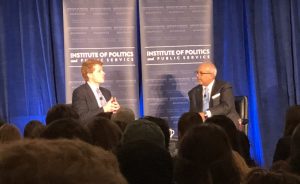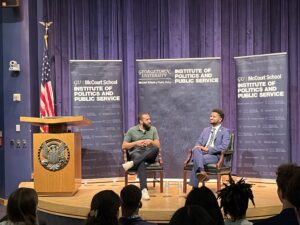This fall, the Georgetown University Institute of Politics and Public Service is hosting its largest class of fellows since its founding in 2015. The Voice spoke with the fellows on Sept. 10 about the impact of the Black Lives Matter movement and the novel coronavirus on the 2020 election cycle and their goals for each of their upcoming discussion groups.
This fellow class includes Dr. Kevin Hassett, former chairman of the White House Council of Economic Advisers for President Donald Trump, former Rep. Mia Love (R-UT), Faiz Shakir (LAW ’06), the former manager of Bernie Sanders’ presidential campaign, Errin Haines, editor in chief of The 19th, Mary Katharine Ham, author and CNN commentator, and Lis Smith, a former senior communications advisor for Pete Buttigieg’s presidential campaign. The fellows serve for one semester and host weekly discussion groups open to all students.
The fellows are united in their belief that this experience will expose them to a refreshing diversity of thought. “I think we all really want people who might not agree with us to be a part of that conversation,” Shakir said. “Tell us where you think differently and know that that’s a place that we are trying to create and one that we will.”
Hassett stated that he wants to help all students, regardless of political orientation. “Our session is going to talk about economic policy and the failures and successes along the way from both parties,” Hassett said.“The main objective for me is to help people who want to make a difference.”
Love, meanwhile, expressed frustration at what she saw as a tendency for people in politics to be “stuck in their ways” and ignore the younger generations.“If you just open your mind and listen, especially to a generation that’s going to be making decisions later, you’ll actually be able to make better decisions by understanding their perspectives,” she said.
Ham, whose discussion group focuses on free speech, is also worried about the effects of political entrenchment.
“Culturally, it’s gotten harder and harder to talk about politics in a way that’s edifying and fun,” she said. “I keep doing it with the hope that I can convert more people to having fun with me on these topics, even when it’s tough and even when we disagree.”
The fellows are bringing their expertise to political discussions that look very different than they have in the past, as most of them acknowledged.
As COVID-19 increases the use of virtual connection in campaigning, Smith sees beneficial implications for future election cycles. “It has forced the parties and campaigns to innovate,” she said. “The fact that we had to grapple with this pandemic is something that I think will produce important innovations that will save us a lot of time, energy, and figure out more efficient ways to reach voters.”
As a Sanders campaign veteran, Shakir also had first-hand experience with virtual campaigning, including the influence of social media.“This election cycle has been more lived online than probably any prior election cycle,” he said. “I think it created a weird bubble life that if you sat there and watched all your friends tweet and Facebook stuff, you could get one perspective of how this cycle was going.”
Even before COVID-19, Shakir believes people’s social media networks impacted how they expected the campaigns to perform, especially in the primary. “There were caucuses and primaries that might have driven to a different outcome than you had assumed,” he said. “Twitter’s not real life, but I think it was being felt in a more acute way this time around because it really pierced people’s realities in an expedited manner.”
Smith also believes social media usage impacted political journalism, often to its detriment. “I almost felt in some cases that reporters, editors became more like who was on Twitter, and that they allowed themselves to believe that the Twitter narrative was equal to the on-the-ground narrative,” she said.
With less than seven weeks to the last day of voting for the presidential election, the country’s response to the pandemic and a surge in activism for racial justice are at the forefront of voters’ minds. As editor in chief of The 19th, a non-profit newsroom focused on gender and politics, Haines believes she has a unique perspective on the issues and their relation to the election.
“I went into 2020 saying that race and gender were not just a story of the 2020 election, they were the story of the 2020 election, and that was true for me even before the dual pandemics of coronavirus and systemic racism,” she said.
Thinking back to the February Democratic primary debate, Haines said she was surprised that reparations were mentioned by some candidates. “What that really told me was that questions of white privilege and institutional racism were absolutely on the ballot for voters,” she said. Haines believes the pandemic is also “on the ballot,” adding, “The pandemic is what this election is about.”
Expanding on the disproportionate impact of COVID-19 on people of color, Shakir expressed a desire to focus on the intersection of race and economic inequality in his discussion groups. “It’s no surprise that everything is being felt unequally in our society, but when you add the layer of race into it, you understand that the impacts are deeply more profound.”







[…] This fall, the Georgetown University Institute of Politics and Public Service is hosting its largest class of fellows since its founding in 2015. The Voice spoke with the fellows on Sept. 10 about the impact of the Black Lives Matter movement and the novel coronavirus on the 2020 election cycle and their goals for each of their upcoming discussion groups. This fellow class includes Dr. Kevin Hassett, former chairman of the White House Council of Economic Advisers for President Donald… GU Politics Fellows share thoughts on Black Lives Matter, COVID-19, working with Hoyas – The Geor… […]
[…] Read original article here. […]